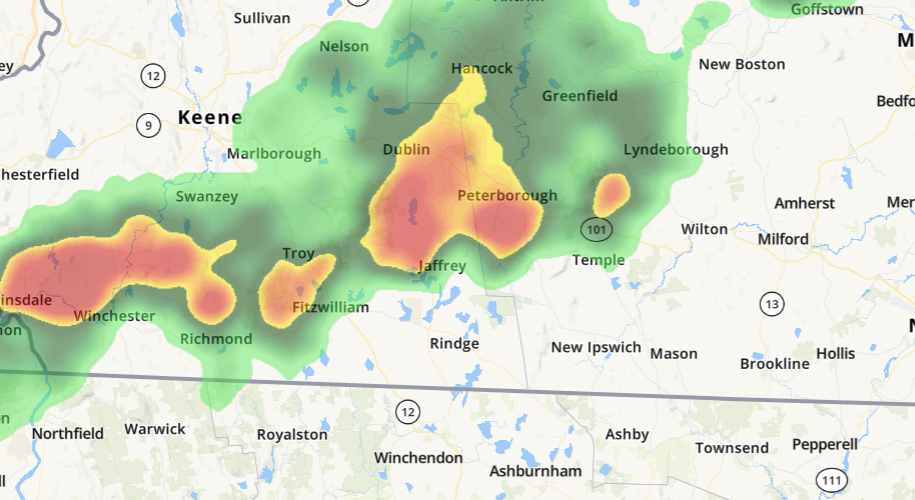To be an official “heat wave” we must reach temperatures of ninety or above for three straight days, and that is actually rare in these verdant hills. It is far more common in the Connecticut River Valley to our west, and, in the Merrimack River Valley to our east, the cities of Lowell, Lawrence, Nashua, Manchester and even Concord often swelter, breaking ninety as we enjoy more reasonable eighties. Back in the days of horse drawn carriages, our population swelled in the summer as people fled the “flatlands”, and we had some hotels which were, for those times, impressive. But those people would have been complaining today, as we hit ninety before noon. But worst was the soaring dew point, which hit 76.5 at one point. That may be normal for Atlanta or Houston, but around here such intense humidity knocks people for a loop.
The problem is that northern flesh hasn’t acclimatized to such heat and humidity. If you expose yourself to such extremes, it is somewhat amazing how the physical body adapts. I know this for I conducted experiments on my own northern flesh. Back in my wandering days I spent a summer delivering furniture in South Carolina, and also later I worked in a nail factory where the room I worked was often over a hundred degrees, in the summer. I discovered my flesh adapted.
The problem is that southern flesh also will adapt, and lose its inherent toughness, if exposed to the delightful summer coolness of the north. And this is exactly what they have done, by air conditioning everything in sight. It may be a hundred in Dallas, but everyone looks as cool as a cucumber, except for the brief moments they dash from air conditioned homes to air conditioned cars, or from cars to air conditioned workplaces, taking lunch breaks at air conditioned restaurants. Likely parks have air conditioned Porto-potties. In any case, they aren’t as tough as they used to be, and if the grid crashes due to the idiotic insanity of the Green New Deal, a day of reckoning will arrive. The new South will have to be as tough as the old South.
I got a taste of how they will feel this morning, as my old and northern body hit the brick wall of heat and humidity, which can kill elderly men. (The problem is we can’t sweat; towards the end of his career as a champion Mohamed Ali complained, ” I just can’t break the sweat I used to break.” I suspect it has something to do with testosterone levels.)
However I didn’t hide from the heat under my bed. I exposed myself to it so that what is left of me could acclimatize. I worked in the garden, but made sure to quit when the temperatures soared through the eighties. Also I worked a much smaller garden than I once did. All I did was prepare soil and plant three pepper plants, two brocolli plants, and two cauliflower plants. My garden will not feed the family, and is basically an old man’s toy.
That did get me outside, where I could sniff the wind and scan the sky and take note of things few care about. (For example, Cardinals keep singing even as temperatures soar.)
Then I went indoors and repaired a bathroom door the children at my Childcare had warped by making it into a swing. Then I watched over the kids as they napped, struggling to stay awake in the soporific heat. They konked out, and I nearly did, the evidence being I was starting to drool. To keep myself awake I watched the radar and lightning maps. A storm popped up with amazing speed up on the western side of Concord, but after shooting impressive lightning the storm rained itself out and vanished from the radar in less than thirty minutes.
While the repression of storms is one attribute of a “Heat Dome”, the very fact such a storm could pop is indicative of the fact the “dome” is not atop us, but south of us. Then, as I had a late lunch, I saw storms starting to pop on radar to our west, and even could hear faint thunder. This is indicative we are actually in the “ring of fire” on the northern edge of the “heat dome.” For a time the radar grew impressive, and some growls of thunder were half-way loud.

I sit and type in “New Ipswich” in the above map, and usually such robust storms would mean we would get clobbered, but they were suppressed in a most amazing manner, which seems indicative of the power of the “Heat Dome”. Distant thunder has growled all afternoon and evening, but never drawn close. We did get a smattering of fat raindrops, the sort that raises puffs of dust as they hit without truly wetting the dust.
However it will be a close call, tomorrow, as to whether we can reach ninety for the third straight day. The core of the “Heat Dome” is further south than expected, and the northern side is eroding. If the thunder starts too early tomorrow, we may well only reach 89 degrees, in which case we have failed and our “heat wave” will not be official.
But I did notice an odd thing, as I poked about past history.
I am trying to understand the dynamics of a “Heat Dome,” and still remain mystified, but of course I looked at the most catastrophic “Heat Dome” to ever hit the USA, which occurred in 1936. And I notices an odd thing. It began in the northeast. In June. Then it retrograded west and burned all the crops in the center of the nation, but it first was noticed in the Northeast, even in New Hampshire by bumpkins like me.
(This is my chance to be an Alarmist, without involving CO2.)
